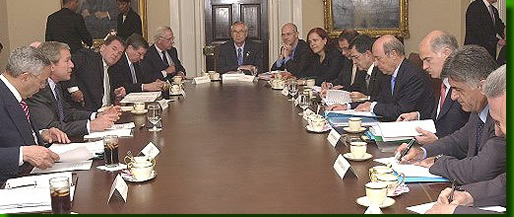On June 12, 2008, E&EM professor Jigar Shah represented the George Washington University at a roundtable on energy and environment at the Cosmos Club in Washington, D.C. The roundtable was entitled “EU-US Cooperation on Energy Research and Development: Needs and Opportunities.”
Dr. Shah, who teaches EMSE 227 Analytical Tools in Energy Management course, said that the session involved lively discussions regarding a number of controversial topics, such as:
• Are sufficiently educated research personnel available in the areas of research interest?
• Are automobile companies doing enough?
• Are innovative utility business models to promote energy efficiency (as in California) being developed sufficiently?
• How do Europe and the U.S. plan to avoid unintended consequences of their research and priorities, for example, subsidies toward the hotly contested corn based ethanol in the U.S.?
The European view was presented by Mr. Raffaele Liberali, Director for Energy within the Directorate-General Research in the European Commission. He is in charge of the implementation of the Non-Nuclear Energy priority and the coordination with Member States and research/industrial stakeholders in the field of non-nuclear energy technologies.
The American view was presented by Dr. Phyllis Yoshida, Deputy Assistant Secretary for International Energy Cooperation at the U.S. Department of Energy. She is responsible for implementing Administration policy for international cooperation on science and technology issues and energy policy issues.
Mr. Liberali discussed strategies for European countries, which though different for each country, utilized Public-Private Partnership (PPP) as the common approach. He described the launch of six initiatives:
• Solar, both photovoltaic and concentrator
• Wind, priority for offshore
• Bio-energy, focus on bio-fuels
• Smart grids, making optimal use of renewable energy
• Carbon Capture and Storage (CCS), undertaking several demonstration projects
• Nuclear fusion
The longer term research, for example in fuel cells, would be undertaken in Europe through alliance with technical laboratories and industries.
Dr. Yoshida emphasized the U.S. research priorities as:
• Clean coal technology
• CCS
• Renewable
• Nuclear
• Technologies for Buildings and Transport
CCS is where European and U.S. research interests best converge. An intranet channel is being set up to facilitate collaboration in this area. In a recent meeting of G8, U.S. and Europe supported a recommendation to support 20 CCS demonstration plants globally.



